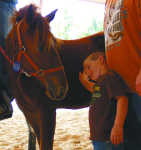Wild horse and burro adoption coming to Girard

For the first time in at least three years, the U.S. Bureau of Land Management will hold a wild horse and burro adoption in the area.
The three-day event featuring more than 50 animals will be conducted at the Crawford County Fairgrounds in Girard. Most of the animals will be horses with maybe six burros, BLM Public Affairs Specialist Paul McGuire said.
Adoption begins with a competitive bid at 2 p.m. Thursday, Sept. 8. First-come-first-served adoptions follow until 6 p.m., then again Friday, Sept. 9, from 8 a.m. to 6 p.m., and Saturday, Sept. 10, from 8 a.m. to noon.
Application approval is required and can be done on site. To qualify to adopt, one must be at least 18 years old with no record of animal abuse. Adopters must have a minimum of 400 square feet of corral space per animal, with free access to food, water and shelter.
A six-foot corral fence is required for adult horses and five feet for yearlings. All animals must be loaded in covered stock-type trailers with swing gates and sturdy walls and floors. BLM staff will be on hand to assist with the short application process, answer any questions and load horses, a news release said.
Standard adoption fee is $125, as set by law. Bidding will start at that amount.
BLM pays a one-time $500 care-and-feeding allowance to adopters of horses at least 4 years old. The allowance is paid in full after one year when adopters receive official ownership title for their horse or horses. All standard adoption conditions and fees apply. A limited number of eligible horses will be available. Younger horses, burros and trained animals are not eligible for this incentive.
The adult and yearling horses and burros offered once roamed free on public lands in the west, the release said. BLM periodically removes excess animals from the range in order to maintain healthy herds and to protect other rangeland resources. The adoption program is essential for achieving these management goals, the release said.
Horses can be kept as trail or ranch animals and both horses and burros can be kept as pets and to keep pasture down. Burros can also serve as guard animals to keep coyotes away, for example, McGuire said.
Typically, BLM puts on adoptions every three years in various locations. The only two places the agency conducts adoptions annually are Odessa and Mercedes, Texas, because the demand for horses and burros there is strong, McGuire said. "A lot of people just adopt them as pets. People love them," he said.
The first time BLM conducted an adoption in Girard was 2005. "We've done very well when we've come to Girard," McGuire said. Hopefully, he said people will come from throughout Southeast Kansas, Missouri and possibly northeast Oklahoma. "It becomes kind of the social event of the weekend. We love coming to small towns to give people an opportunity to participate in the program," McGuire added.
BLM manages vast amounts of land nationwide for a number of different purposes. "We've got about 200 different herds spread across this vast western range," McGuire said. BLM monitors population levels and when those exceed a certain number, BLM removes the animals and offers them for adoption.
"The main purpose is to manage those wild herds on the public lands. Adoption program essential component of that," McGuire said. "... When they (participants) adopt, they're actually participating in a very material way in helping manage this resource on the public range."
Horses that aren't adopted will eventually be sent to contracted long-term pastures, many of which are in Kansas and Oklahoma, where they live out the remainder of their natural lives, he said.
The Crawford County Fairgrounds are located at 397 S. 140th St., two-and-a-half miles east of the intersection of Highway 47 and Highway 7. For more information, call 866-4-MUSTANGS (866-468-7826), or visit www.blm.gov/nm.
